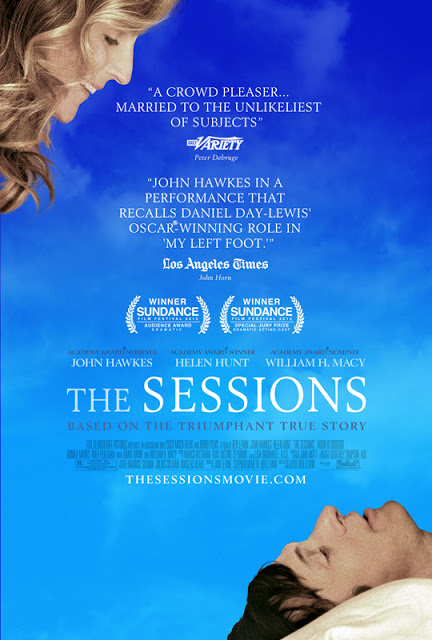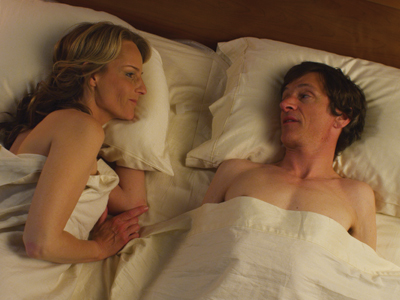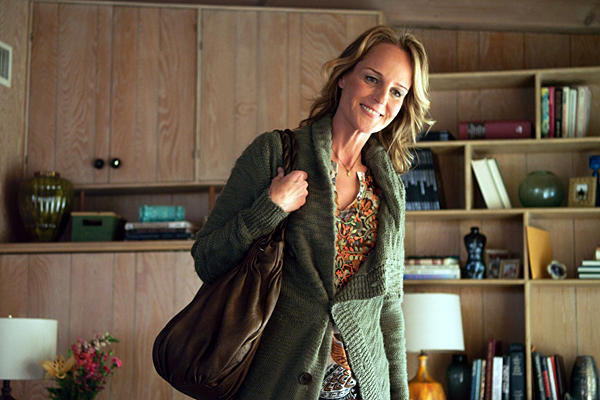 |
| poster for The Sessions |
 |
| Helen Hunt as Cheryl Cohen-Greene with John Hawkes as Mark O’Brien |
 |
| Helen Hunt as Cheryl Cohen-Greene |
———-
The radical notion that women like good movies
 |
| poster for The Sessions |
 |
| Helen Hunt as Cheryl Cohen-Greene with John Hawkes as Mark O’Brien |
 |
| Helen Hunt as Cheryl Cohen-Greene |
———-
Ben Lewin’s little known independent film, The Sessions, has unfortunately been lost in this year’s Hollywood shuffle, a true shame since the film is engaging, lighthearted and uplifting. The award-winning film premiered at the Sundance Film Festival and after a standing ovation and winning the Audience Award for US Drama and a special Jury Prize for Ensemble Cast, it’s now being recognized on an even larger scale. Helen Hunt has been nominated at the Academy Awards for Best Supporting Actress and John Hawkes was nominated for Best Actor in a Drama at the Golden Globes (though that award went to Daniel Day Lewis for Lincoln).
 |
| John Hawkes as Mark O’Brien in The Sessions |
At first glance, the main theme of the movie appears to be sex, which of course it is, and which of course is so much more than that, being about love, relationships and taking chances. However, I appreciated the very frank, forthright way that the film dealt with sexuality, a facet that was spurred on by Helen Hunt’s lovely portrayal of the straight-talking sex surrogate, Cheryl. Clinical terms for genitalia are thrown around easily and Hunt’s unashamed interaction with nudity and the acts of sex are really refreshing.
It was wonderful to see so many disabled actors with similarly frank discussions of their sexual habits, a surprising and sweet element to the film that really grounded it’s central theme: sexuality. Sexuality as an experience that binds us all with it’s mysterious and yet, overwhelmingly normal nature. His discussions with his caretakers as they commiserate about their own sexual experiences make the similarities between their interactions with that part of life apparent as do the difficulties for O’Brien to do something so simple that it is often taken for granted.
Because of O’Brien’s disability, the film gives ‘the body’ a really fabulous consideration, as of course, O’Brien must become comfortable with his body’s own limitations. There is a really lovely scene when Cheryl (Hunt) holds up a full-length mirror so that O’Brien, who hasn’t seen his own penis since he was six, can finally see himself: all of himself. His self-consciousness about his body drives him to a sense of self-loathing and deep insecurity about his own deservedness for sex and love, a theme not uncommon in our society.
The scene with the mirror is beautifully linked however with Cheryl’s own considerations about her body. Cheryl has decided to convert to Judaism and during the process she must immerse herself in a pool of water as a symbol of transformation, a situation that involves her disrobing in front of an older woman who remarks that Cheryl is unusually comfortable getting naked, unlike other, younger woman she encounters. This woman states that this is a true shame, since our body is so important and is the thing that God has crafted just for us. After this simple comment, with a look of sadness on her face, Cheryl immerses herself in the water, obviously aware of her body’s health; this action triggers the recent memory of holding up the mirror for O’Brien and we see the two scenes as a parallel.
Religion plays an important part in the film as well as sexuality since O’Brien is an active Catholic and his priest, despite the church’s concern for sexual immorality, actively encourages him to have this experience; an action that shows a positive influence on O’Brien’s life and state of mind. However, O’Brien’s parents and their teachings on sex, or rather their complete avoidance of the topic, imbue O’Brien with a deep shame for his own sexual nature; a problem that often causes him to blame any sexual difficulties that he has with Cheryl on his unworthiness and a belief that he’s being punished for his sins.
The film features a bit of nudity, specifically on the part of Helen Hunt, a fact that got quite a bit of notice since there’s a few scenes of Hunt full frontal (gasp!) but scenes that were handled very well, again with Hunt’s very straightforward character which really translated well on screen.
 |
| Helen Hunt as Cheryl in The Sessions |
Hunt is definitely deserving of an Oscar for a great performance as both the straightforward sex surrogate and the wife, mother and woman who begins to care very deeply for O’Brien and the experiences they’ve shared.
O’Brien’s experiences, being his search for love and his belief that having sex will get him there, an innocent belief that many of us share, become the transformative events that push him into stronger relationships. In the end of course, the final thought is that it’s not the sex itself, but the journey with the people that he meets that makes him a stronger, more whole person.
———-
Rachel Redfern has an MA in English literature, where she conducted research on modern American literature and film and it’s intersection, however she spends most of her time watching HBO shows, traveling, and blogging and reading about feminism.